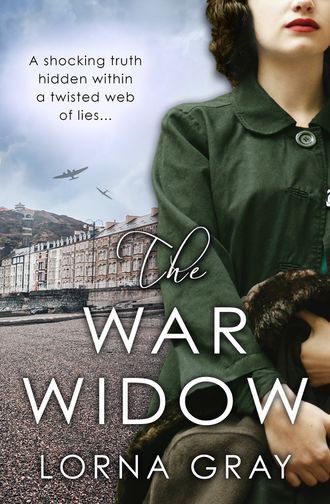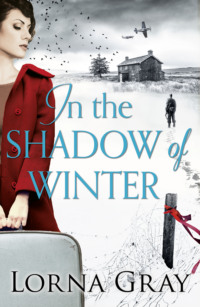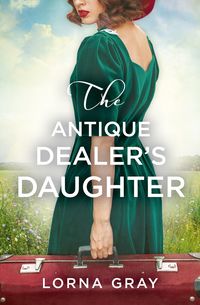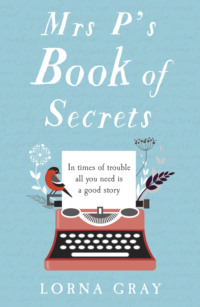
Полная версия
The War Widow
So I paid my bill and climbed to my feet with absolutely no expectation other than that I would soon know precisely what part she meant to play if I followed her.
That being said, the first step outside was taken a little less recklessly. Regardless of my decision I couldn’t help glancing behind as we stepped out on to the pavement but if Jim Bristol was there, I didn’t see him. I didn’t see those two men either. Their car was still waiting serenely beneath the university building. I was just checking the darkened telephone booth and deciding that it was likewise definitely empty when the woman beside me suddenly let out a wild shriek and leapt into the road. Quite understandably, it was a moment or two before I realised the rapidly approaching car was a red Rover 10 and her scream was a cry of delight.
It was delight though, and now Mary was laughing like a maniac. She was standing there in the middle of the road, striking a pose of careless elegance as she turned back to me, eyes bright and absolutely determined to defy the box-like nose of the car that squealed to a stop, quivering, barely inches from her knees.
“Are you insane?” Adam didn’t sound remotely amused. I suppose it was Mary’s way of proving the cost of following her sister’s orders to ensnare her man; it was just unfortunate for her that her sister wasn’t watching to learn the lesson and we were. I watched Mary sashay around to the driver’s door and found myself alternating between fascination that anyone could really act like that and make it seem such a natural part of herself, and watching the road for any of the men who might be after me. There was also a part of me – the wiser part – that was adding Adam to the list and contemplating scuttling off while he and Mary were distracted. In the road, Mary had come to a rest with her hand laid artlessly along the top of the driver’s door. Her coat was trailing from her other hand onto the grimy tarmacadam.
“Yes, I’ve gone mad,” she admitted firmly. She’d noticed the coat’s plight and draped it carelessly about her shoulders with about the same elegance as a millionaire with a fox fur. “As I’ve been telling everyone who’ll listen, I’m at a loose end and acting like a five year old.”
“Most five year olds that I’ve met have learned a little road sense.”
Mary was unsquashable. But she did at least moderate her voice so that it was a glimpse of her real self. It had the bizarre effect of making her whole appearance – clothes, make-up and all – seem like borrowed plumage applied under the strict supervision of another. “Where are you going? You promised to take me with you.”
I saw him suppress a smile as he shifted the car out of gear. “A castle.”
“I love castles.” The idea that her charm was a front was gone again. She chose to be this way too. A finger ran along the top of the doorframe and I swear she actually simpered.
Adam only raised an eyebrow. Mary laughed. “All right, I don’t like castles; they’re boring. I was going to catch a bus to the beach but it’s hardly the time of year for it and perhaps you’d let me come with you instead? It’d be so nice to actually go somewhere, even if it is a castle. Please? We’ll be quiet, I promise; won’t we Katie?”
I baulked at this sudden inclusion. Now I really did wish I’d taken the opportunity to slip away. She jerked her head and beckoned me closer to add weight to her plea but I gave a quick silent negative and remained where she had left me, hovering foolishly on the edge of the pavement. His gaze followed hers to fix on me for the first time and as a respite from the usual terrors, the embarrassment was excruciating.
I made it worse by saying; “If he’s got things to do, I’m sure he’d much rather be on his own.”
Mary rolled her eyes. “Oh, ignore her; she just doesn’t want to admit that she’d much prefer your castle to my beach. And she’s got to come. She’s playing the part of the maiden aunt to my youthful heroine. Please?”
Adam’s resigned sigh was carried on the light breeze. With a triumphant smirk at me, Mary darted round to the passenger door and slid in. She fixed me with an expectant stare but Adam was already climbing out and dragging open the rear passenger door for me. He gave a brief jerk of his head. “Come on,” he said with that slight smile of his that might have been teasing, or it might not.
I moved towards the open door. He wasn’t looking at me any more but that may well have been because he too was noticing the approaching bus. It was squeaking huffily to a halt behind the stationary car instead of running me down. All the same I flinched aside instinctively. And then I gave a self-conscious laugh that couldn’t help turning into a lift of my eyes to Adam’s face when I realised he’d been sharing the thought too. But he’d already suppressed his own reaction and was chivvying me into the back seat so that he could press the door shut on me and release the impatiently idling bus. Then, with an apologetic lift of his hand, he climbed in and prepared to send the car cruising away down to the promenade.
He didn’t even get as far as releasing the handbrake. Mary exclaimed ‘Jim!’ and a hand met the door handle to my left as a different male voice said cheerfully, “Room for one more?” Then Jim Bristol was sliding in beside me to share the cramped confines of the ridiculously small back seat and smiling at me while I was fumbling with the door catch on the other side with every intention of getting straight out again. Unfortunately Adam had already sent the car on its way and Jim was distracting me with an idle pleasantry on the delight of meeting friends until I got confused between the impulse to escape and the impulse not to be rude. And then it was too late.
Chapter 8
Our escape from the town was a lurch into a different kind of tension. The wide curve of the Victorian seafront promenade vanished at the turn beneath the vast art deco King’s Hall with its amusements and tea dances, and it seemed only a moment later that we were emerging from the crowded crush of shopping streets to trace a course inland. With these two men in the car it felt like I was a captive but I couldn’t be. I couldn’t be. Not really.
If I told myself that enough times perhaps I would believe it.
Beside me, Jim was leaning slightly forwards so that he could join Mary’s animated conversation in the front. I think he’d guessed pretty quickly that all he was going to get from me was a thin-lipped smile. We were literally inches apart – the car was so narrow that his knee kept knocking mine. I had felt trapped by him at Devil’s Bridge but the muscular presence I’d experienced there had been nothing compared to the inescapable closeness to him here. He seemed insufferably strong in this tiny space. It wasn’t hard to see that this was a man who had taken a firm grip upon the trials of army life during the war and found he was more than capable of meeting them. He was also truly very handsome. He was, as I have said, leaning forwards slightly and it cast his profile into elegant relief so that his jaw was perfectly defined with just the barest grain of a fair shadow beginning to show. His mouth was mobile and the brief gleam of teeth as he smiled in response to something Adam said was very engaging. None of this really fitted the part of sinister collaborator to those two men. I also wouldn’t have expected their only weapon to be the well-thumbed tourist guide now held in his right hand. I permitted myself a glance at the reflection of Adam’s face in his wing mirror. Where Jim shone with amusement, Adam’s expression was calm and concentrated, and I couldn’t tell what either man was thinking.
I did at least recognise the road we took. We crossed the river at Machynlleth and traced the winding road northwards into deep craggy valleys that had long since settled down for the coming winter. I began to feel a vague nervous excitement about where we might be going. My trips with Rhys had only rarely taken me inland. Rain-soaked mountains oppressed him he had said and our filial visits to the area had only really reached as far as busy towns and fishing ports where he might be able to steal some shots of the locals.
Wherever Adam was taking us today, it was safe to say populated areas were not his target. The car swung left off the main road and rolled gingerly down an uneven lane as Adam navigated his way without needing to refer to a map. I briefly toyed with the idea of panicking but I didn’t do it and eventually, with a wide valley below us and the distinctive sweep of the lower range of Cadair Idris above, the car drew into a wide gravel lay-by and the engine was silenced.
It wasn’t a popular destination. There was no house, and no prison to match my imagination either. Only two other drivers had managed to conserve enough fuel for the trip to this remote spot; a blue Morris and what looked like a farmer’s run-about. Nothing moved. The hush was sudden and very intense, and I sat there in a questioning stillness, listening for any sound at all, until Mary tugged on her door handle with such a clunk that I believe Jim and I both jumped.
Jim laughed. She climbed out, shaking the creases out of her skirt. She gave a little turn. “Well.”
“Well indeed.” Adam was out and dragging open my door. I think Jim had expected me to slither meekly out after him at his side but I didn’t. I climbed out through the door Adam opened for me and stood there while he locked up the car feeling absurdly like I was expecting him to shield me.
I don’t know what from because there was nothing here except a crude lay-by and a footpath into the short scrubby woodland on the far side.
Adam spoke over my head across the roof to the other two. “Ready for a cultural delight?”
“If this cultural delight involves any more sheep droppings, I’m staying in the car.” Mary was examining the gravel beneath her flimsy shoes. “Why are we here again?”
Adam pocketed his keys and set off towards the dense little woodland. “I’m here to do research. Jim’s here because it saves trying to sidestep the petrol shortage by paying for a hired car if he uses my fuel instead, Kate’s here because she didn’t know how to refuse and you’re here, I believe, because you threw yourself into the road and begged to come, but forgive me if I’m wrong.”
The footpath was wider than I’d thought. It was obviously well used. I trailed along in their wake beneath supple limbs of overgrown hazel that swiftly closed in overhead. I couldn’t hear a thing beyond the whisper of old leaves in the branches and the distant questioning mew from somewhere up above that was a buzzard. It was very hard to judge whether we were still near the valley floor or rising as I thought. Then the tangled thicket opened to clear rocky grassland and I had to forget everything, even every little doubt, for a moment.
Adam had stepped aside to let us pass. To our left, the land fell dramatically away to a vast glacial valley that curved gently away towards the distant sea. To my right stood Adam and beyond him were the shattered remains of a castle. The landscape ached with the memory of the lives that had sheltered within those walls.
Mary took control of the scene. She cast a look around with wide eyes, dismissed it all with a shrug – because that was what she was expected to do – and then turned back and pouted. “Go on, Mr Adam Hitchen: explain. What’s so special about a mouldy old ruin?”
It transpired that this was Castell y Bere, a Llewellyn strong-hold and an 800-year-old monument to a defiant people and the vital trade routes they had guarded. What made it particularly special to me was that this was the first place in days that allowed me the peace in which to absolutely set aside my fears and even my scrutiny of my companions’ motives.
Even Jim left me alone here. He seemed content to watch the artist from afar as she settled comfortably on top of the cool stones of the curtain wall, pencil in hand and the faithful sketchbook lying open across her lap. Mary had long ago vanished to seek excitement elsewhere and Adam was out of sight on the other side of the structure, doubtless writing notes and staring intently at the tumbled stones by his feet. That left only me and Jim and, as I have said, he was content to leave me alone now. He was sitting on a broken flight of stairs about fifteen yards away, hands about his knees and idly contemplating the view.
I sketched in the turn of the river as it snaked across the floodplain to disappear behind Jim’s shoulder. That done, I was lucky enough to discover that I still had some water in the very stale flask that lurked in the bottom of my bag. Tipping a few drops into its metal cap, I began to add the little hints of watercolour here and there which would bring my painting to life. No one would notice that this whole piece was composed just so that I could make a sly portrait of the man in the foreground.
“Are you painting?” Mary suddenly reappeared and threw herself down beside me. “May I see?”
She took the sketchbook with her customary self-assurance and leafed interestedly through the pages. She paused here and there to ask a question about the subject or scene and it was very sweet how she took care not to smudge the drying paint.
“Who’s he?” She wasn’t looking at my cunningly signed and dated record of Jim’s presence. I saw with a jolt that she had discovered the sheaves of paper that I kept as little treasures inside the cover.
“Rhys,” I said, carefully scrutinising her face for her reaction. “My husband.”
“Your husband?”
“Ex,” I clarified. Her reaction was reassuring. He meant nothing to her, except more idle intrigue.
“Oh,” she said softly, examining the vivid green eyes as they stared insolently back at her. It had been a good likeness; in those days my figure work had emulated the flowing energy of those portraits by El Greco whose subjects seem to be perpetually in motion. This quick study of my husband’s face had captured his expressive good looks with the dramatic lighting that had been my specialism. Rhys had always claimed that the intense shadows made him look sulky. If the cap fits, I had later thought, but not dared say it.
Mary asked, “When was that? Your divorce, I mean.”
“We divorced last year. That portrait is from ten years before that – the year we were married.”
“Oh,” she said again, reading the pathetically soppy inscription that recorded the date: 12 June ’36. “Is that how you met? Through painting?”
“It was,” I confirmed. This at least was a relatively painless piece of my past. I had been a freshly arrived young student working under my uncle. There was no embarrassment in remembering the crucial first exhibition I’d helped the old man hang and how it had also been my first introduction to his fearsomely precise photographer friend. I’d thought Rhys was the most inspiring man I’d ever met. He’d liked me too. He’d liked my youthful enthusiasm for his old friend’s small Cirencester gallery and my optimism allied with the fact that, as a student of art, I was almost as passionate about the scope of Rhys’s work as he was.
Mary was examining his face a little more closely, perhaps reading the traces of the rise and fall of my marriage in the uneven brush strokes. Then she returned the wad to its home and handed the sketchbook back. “We thought you were a spinster. You’re so self-contained.”
That made me smile. “No.”
We sat for a while in a companionable silence, her contemplating the view, me finishing my painting, before, with a sigh, Mary abruptly twisted in her seat to draw her feet up onto the broad stonework and began fiddling with a bracelet. I painted for a while longer but then she sighed again, more loudly, and I realised what she wanted.
“Is something the matter?” I finally asked, just as I was supposed to do. She was staring at the metal band that encircled her wrist and her face had set into an unusually serious frown that was somehow very endearing.
She said abruptly, “It’s irresponsible, don’t you think?”
“What is?”
“The fuss they’ve been making about the Royal Wedding. They’re deliberately bombarding us with the fairytale of being a princess and being swept off one’s feet by a beau and it’s unachievable.”
I couldn’t help smiling. “But the bride in question is a princess.”
“Don’t laugh; it’s true. It sets an unobtainable standard and gives rise to all sorts of pressures and expectations. And they keep making such a big statement out of the fact the poor woman has had to hoard her clothing coupons like the rest of us as if that’s a good thing. I’m so heartily sick of having to make-do-and-mend.”
I caught a brief fluttering glance beneath those elegant lashes. It made me say blandly, “Well at least if you wanted to escape all the fuss, I suppose you’ve come to the right place.”
I saw her blink at me incredulously and then blink again. “Are you being serious? You are being serious.” She laughed. “Haven’t you noticed that the town is overflowing with people and events and tea dances? It’s November: the town should be battened down for the closed season and instead all the usual summer entertainments are out in force. It’s like that tale of the swallow that stayed for winter or something. They’ve got the funicular running up and down the hill for heaven’s sake and I should know because it was the only activity remotely pertaining to a holiday that I managed to do yesterday.”
I stared at her blankly. I really hadn’t noticed.
She continued, “It all makes a bit more sense now that I know you were married. Your independence, I mean. We had wondered if you were a real oddity; you know, one of those aggressively intellectual women who purse their lips and forge their own path come what may and are destined ultimately to decay into irritating habits and dressing in frills for dinner like the Miss Bartlemans.”
Something unguarded in me made me say rather dryly, “I’m flattered that you think I’m an intellectual.”
I’d surprised her. Obviously she didn’t expect me to react at all. She blinked at me and drew her coat more closely around her waist. There was a chill in the light breeze here. Having secured her coat with its belt, she then returned her attention to the heavy bracelet around her wrist. I saw the corners of her lips curve. “I suppose it’s natural that you wouldn’t feel the burden of being in a nation obsessed by a wedding. You’ve done your stint in acting the part of a romantic. You’re free to be alone now and no one can judge you for it.”
I had to raise my eyebrows at that. She cast a sly sideways glance at me and grinned.
“All right, everyone gets judged. All the time. But it’s not the same, you know it’s not. A few years ago I drove ambulances – at least I did when the old drivers let me which wasn’t all that often – and looked glamorous while I did it and everyone said it was a jolly good thing because we were keeping the image of the merry English Rose alive so that the troops had something to dream of while they were laying down their lives to defend us. Now the men have come home again and it’s important we still keep hauling out our tired old glamour even if it is all getting rather worn and thin, because now our job is to be swept away by marriage like the blushing females they dreamed of.”
Конец ознакомительного фрагмента.
Текст предоставлен ООО «ЛитРес».
Прочитайте эту книгу целиком, купив полную легальную версию на ЛитРес.
Безопасно оплатить книгу можно банковской картой Visa, MasterCard, Maestro, со счета мобильного телефона, с платежного терминала, в салоне МТС или Связной, через PayPal, WebMoney, Яндекс.Деньги, QIWI Кошелек, бонусными картами или другим удобным Вам способом.





